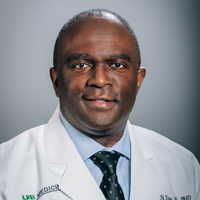 Alan T. N Tita, M.D., Ph.D.
Alan T. N Tita, M.D., Ph.D.
The Heersink School of Medicine Office for Diversity and Inclusion (Heersink ODI) recently held its virtual Diversity Grand Rounds, featuring Alan T. N Tita, M.D., Ph.D. as the keynote speaker. The annual event, held virtually during Second Look Weekend, was open to current faculty, staff, and potential UAB residents.
Mona Fouad, M.D., MPH—Associate Vice President for Diversity, Equity, and Inclusion at the University of Alabama at Birmingham and Senior Associate Dean for Diversity and Inclusion at the Heersink School of Medicine—gave a warm welcome to attendees and emphasized the importance of creating a diverse and inclusive environment for students, trainees, faculty, and staff.
The Professional Excellence Awards
Before the keynote speaker, Fouad highlighted one way in which the successes of our diverse faculty 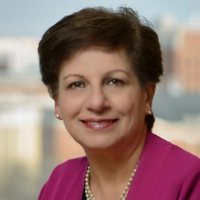 Mona Fouad, M.D., MPHat Heersink School of Medicine are recognized-- the Professional Excellence Awards. The award recognizes one member from each of the four faculty associations who have excelled in research, teaching, and service within the past three years. Nominations are submitted by department chairs and division directors and then judged by the Heersink ODI Advisory Council.
Mona Fouad, M.D., MPHat Heersink School of Medicine are recognized-- the Professional Excellence Awards. The award recognizes one member from each of the four faculty associations who have excelled in research, teaching, and service within the past three years. Nominations are submitted by department chairs and division directors and then judged by the Heersink ODI Advisory Council.
This year, Heersink ODI received 33 nominees from 14 departments, the highest in the award program’s three-year existence. After review, the council selected four outstanding individuals as recipients of the 2023 Professional Excellence Award: Tamera Coyne-Beasley, M.D., MPH; Isabel Scarinci, Ph.D., MPH; Michele Kong, M.D., and Rodney O. Tucker, M.D., MMM, as the winners.
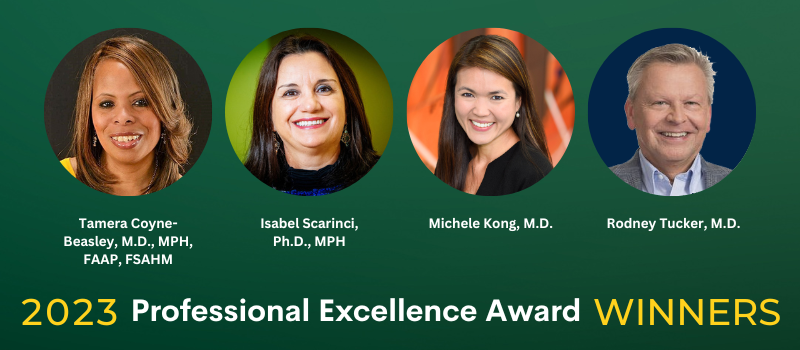
Fouad concluded the announcement by reiterating the importance of awards and events, such as this one, in continuing growth and understanding of the diverse world around us.
Fouad then turned the program over to Raegan Durant, M.D., MPH, associate dean for Diversity and Inclusion at the Heersink School of Medicine, to introduce the day’s speaker.
Welcoming Keynote Speaker: Dr. Alan T.N. Tita
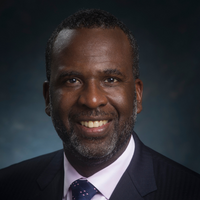 Raegan Durant, M.D., MPHDurant began by describing Dr. Tita’s expert leadership in maternal fetal medicine, global health, and perinatal epidemiology. Durant explained that Tita “has led and continues to lead the design and conduct of collaborative multisite and single-site clinical trials and observational studies that influence practice and global policy. Just like his global work, his academic pedigree is global as well.”
Raegan Durant, M.D., MPHDurant began by describing Dr. Tita’s expert leadership in maternal fetal medicine, global health, and perinatal epidemiology. Durant explained that Tita “has led and continues to lead the design and conduct of collaborative multisite and single-site clinical trials and observational studies that influence practice and global policy. Just like his global work, his academic pedigree is global as well.”
Tita received his medical degree from the Faculty of Medicine and Biomedical Sciences in Cameroon, his Master of Public Health in International Health from the University of Leeds in England, and his PhD from the University of Texas Health Science Center School of Public Health in Houston. He completed his residency in obstetrics and gynecology at Baylor College of Medicine and his maternal-fetal medicine fellowship at UAB.
Tita holds various positions, including the UAB Mary Heersink Endowed Chair of Global Health, director of the Mary Heersink Institute of Global Health, and Heersink School of Medicine associate Dean for Global Health. Durant said “Last fall in recognition of Tita’s career of scholarship and contributions to health and research, he was elected to the National Academy of Medicine, one of the highest honors for clinicians and biomedical scientists.
Tita’s Reasons for coming to UAB
Tita began by discussing his personal experiences for choosing UAB. He emphasized that the best way to understand why UAB is a great place is to visit it, as everyone has different reasons for finding the city and the university attractive.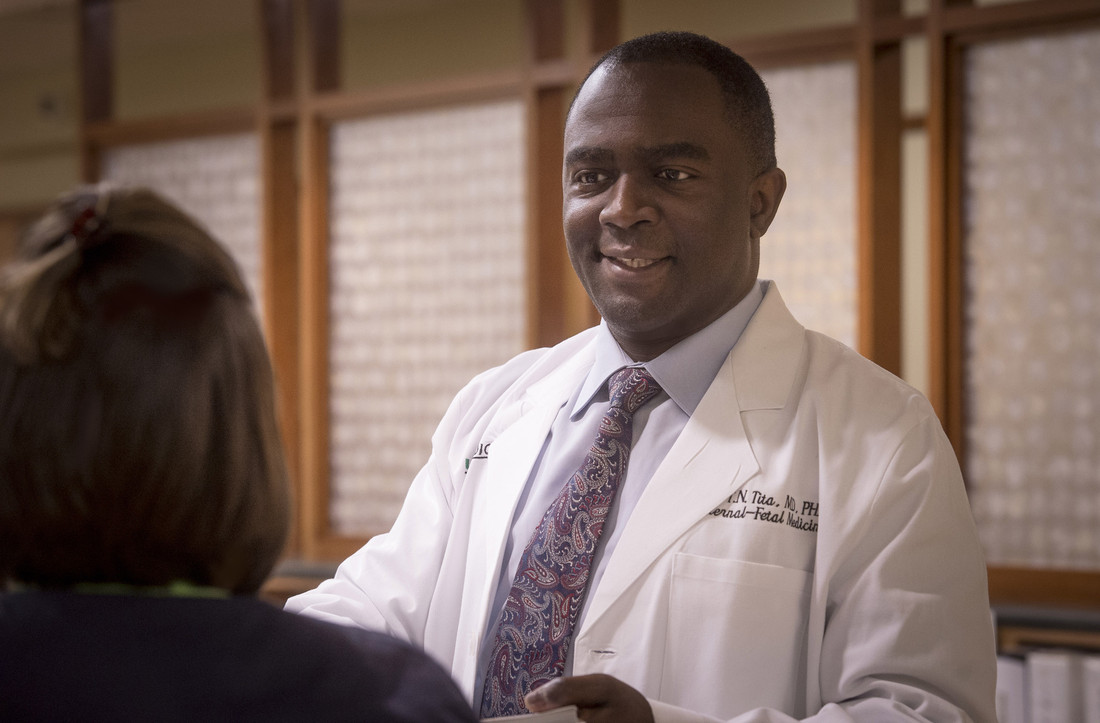
Tita discussed a few reasons that attracted him to UAB, citing the opportunity for solid training in maternal fetal medicine, the chance to participate in life-saving global research, and the exposure to a premier network of researchers and clinicians. In addition, Tita was attracted to UAB because it is home to several interdisciplinary centers, creating a dynamic environment for professionals from different backgrounds to work together.
UAB's Contributions to Maternal Health
Tita focused his talk, in large part, on maternal health—particularly maternal infections, which are a top cause of maternal mortality worldwide. He continued by referencing the racial and ethnic inequities in maternal and infant health and ongoing initiatives to address them, including an American Heart Association Health Equity Research Network, which you can read more about here. Tita also spoke about work to facilitate global health improvements and equity in shared outcomes through the new Mary Heersink Institute of Global Health. Lastly, Tita spoke on the use of adjunctive antibiotics, as a cost-effective approach to reducing maternal mortality.
You can watch his full talk below.
Final thoughts from Dr. Tita
Tita concluded his talk by mentioning the positive progress made in Birmingham since the civil rights movement and the need to continue working towards optimizing diversity and inclusion. His hope for potential residents in attendance is that they would be convinced that UAB and Birmingham are the places where they too could find success.
After the keynote, one question stood out.
Fouad thanked Tita for his comprehensive and fascinating presentation. She followed up with a question that hit home for many attendees:
“What was the drive, why didn't you give up, and what did you find here as an environment that got you to keep moving forward in your research?”
Tita responded, “I think it's a matter of being at the right place at the right time and really believing in what you have.”
“I think UAB provides a great environment and mentorship. One of the things I want to highlight is the notion that you pass the baton to someone, and they pick it up and run with it. That’s what I hope to continue doing for the rest of my career. The items I highlighted early on, the connections that this environment allowed us to have, the mentors within obstetrics and gynecology, and outside the department in biostatistics, neonatology, et cetera, were all people who held the baton and were open to collaborate and receptive to new ideas. Persist with the counsel of mentors”